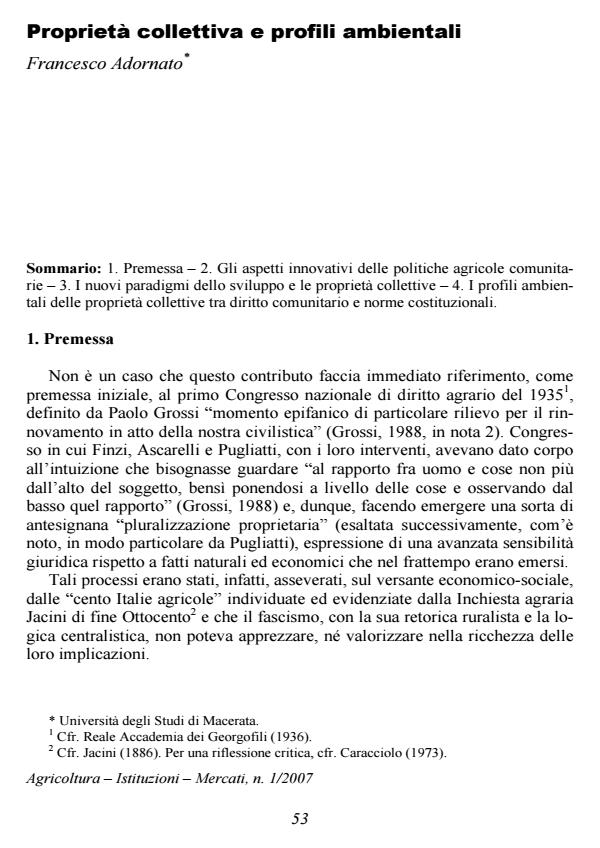Proprietà collettiva e profili ambientali
Titolo Rivista AGRICOLTURA ISTITUZIONI MERCATI
Autori/Curatori Francesco Adornato
Anno di pubblicazione 2007 Fascicolo 2007/1
Lingua Italiano Numero pagine 12 P. 53-64 Dimensione file 57 KB
DOI
Il DOI è il codice a barre della proprietà intellettuale: per saperne di più
clicca qui
Qui sotto puoi vedere in anteprima la prima pagina di questo articolo.
Se questo articolo ti interessa, lo puoi acquistare (e scaricare in formato pdf) seguendo le facili indicazioni per acquistare il download credit. Acquista Download Credits per scaricare questo Articolo in formato PDF

FrancoAngeli è membro della Publishers International Linking Association, Inc (PILA), associazione indipendente e non profit per facilitare (attraverso i servizi tecnologici implementati da CrossRef.org) l’accesso degli studiosi ai contenuti digitali nelle pubblicazioni professionali e scientifiche.
The author confronts the theme of the collective property, analysing in particular its environmental aspects. The analysis starts from an exam of common agricultural policies and, specifically, regulation 1782/2003 on the so called mid term reform of the Cap and regulation 1698/2005 on rural development. A new model of statuality founded, on one hand, on policentrism of the sources and, on the other hand, on the principle of subsidiariety and connoted by territorial specificity emerges from these regulations, and allows the designing of agricultural policies that are more articulated and adherent to the needs of the member states. It is precisely with regards to this new approach of the Common agricultural policy that we can appreciate the strategic role that, in a dimension of eco-compatible development, collective properties, and in particular forestal ones, can have (see article 49 regulation no 1698/2005). At a national level, the productive and environmental recovery of collective properties (in this new context of sustainable development and social cohesion) finds constitutional support in articles 43 and 44 of the constitution. These can be interpreted innovatively and coherenty with both national and community law. On the other hand, the new formulation of article 2135 of the civil code eliminates all doubt about the possibility for the agricultural entrepreneur to undertake activities aimed at the provision of services through the prevalent use of the enterprise’s equipment or resources normally employed in the agricultural activity exercised. Article 39 of regulation 1698/2005 specifies that agro-environmental payments can be made also to other land managers, as well as farmers, when this is justified by the achievement of environmental objectives. In conclusion, it is codified that communities that own collective lands can provide, in a lucrative way, environmental services. Communities that own collective lands conveniently usable as woodlands and permanent farmlands through the representative authority of its inhabitants and in one of the juridical forms identified by the current rules, receive from community law, in accordance with their own national discipline, instruments and support (prescriptive and financial) to start new processes of development.
Francesco Adornato, Proprietà collettiva e profili ambientali in "AGRICOLTURA ISTITUZIONI MERCATI " 1/2007, pp 53-64, DOI: